The night the SNP leadership contest turned personal
- Published
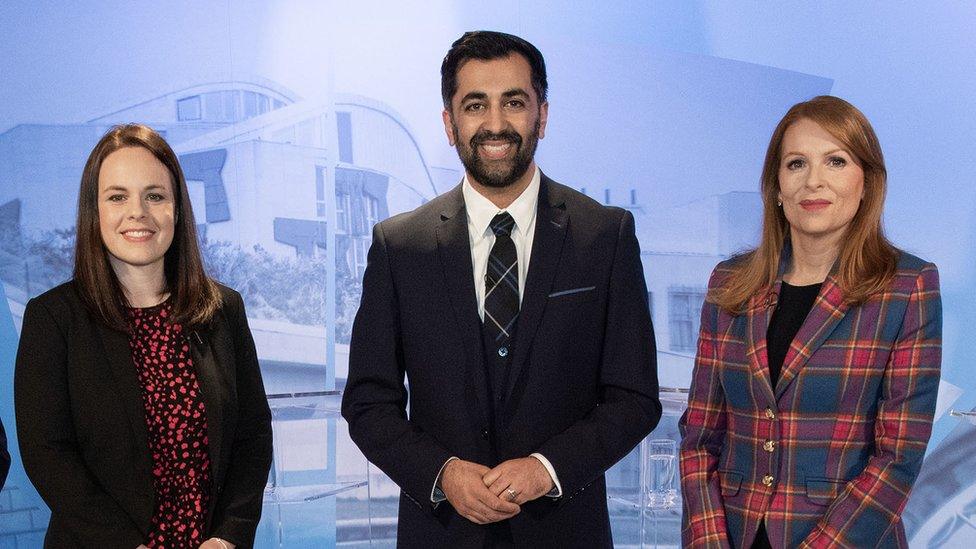
The first TV debate of the SNP leadership contest was a rancorous affair, with the three candidates attacking each other as well as the party's record in government and in the pursuit of independence.
What does this mean for the race going forward, and for how the SNP will govern once it's all over?

On Tuesday night the tensions that had been smouldering beneath the surface of the SNP leadership contest burst into flames.
Most of the party was blindsided by Nicola Sturgeon's sudden resignation last month, and those who wished to replace her had to build campaign machinery and policy platforms from scratch.
They were allowed a shoestring budget capped at £5,000 apiece and had only a few weeks until voting began.
Because the three candidates also built quite distinctive platforms - Humza Yousaf focusing on social justice, Kate Forbes on the economy and Ash Regan on independence - they rarely came into direct conflict, bumping along at cosy in-house hustings events where the tone was fairly collegiate.
Most of the shots that had been fired in the early stages of the contest came from those who are not standing - like John Swinney's attack on Ms Forbes over her views on gay marriage.
But during an explosive TV debate hosted by STV, the three candidates decided to absolutely wire in about each other.
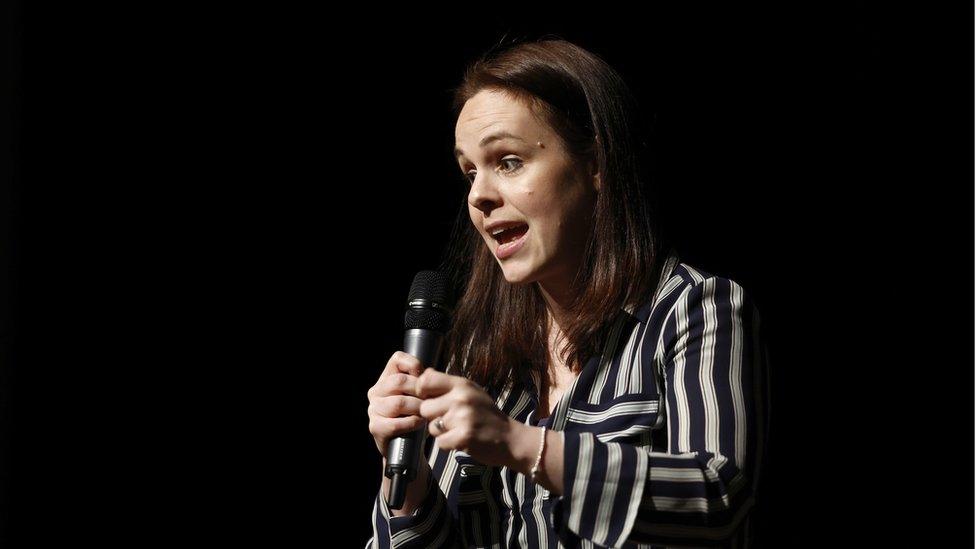
Kate Forbes launched a blistering attack on cabinet colleague Humza Yousaf's record in government
The format, which featured the candidates cross-examining each other, was well designed to draw out policy differences.
But jaws still dropped around the country as Kate Forbes launched into a stunning takedown of Humza Yousaf's record in government.
In a clip likely to feature in Labour and Conservative party adverts any moment now, she said he failed to get the trains running on time as transport spokesman, stretched the police to breaking point as justice secretary and presided over record hospital waiting times as health secretary.
It has been clear for some time that Ms Forbes sees Mr Yousaf as her key opponent in this race. He is widely seen as the candidate offering continuity from the Nicola Sturgeon era, so she has deployed "continuity won't cut it" as her slogan of choice.
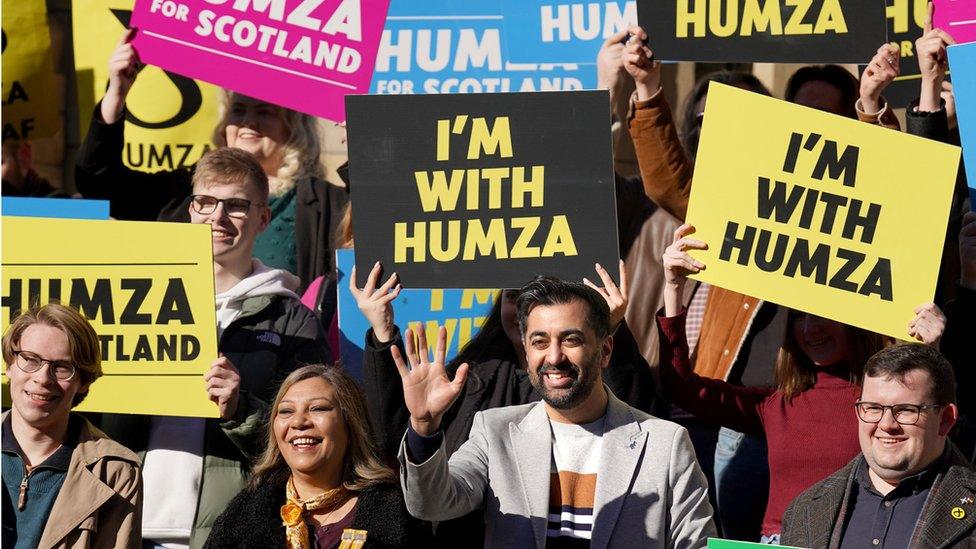
Humza Yousaf has played up his endorsements from big SNP figures - but has become the "continuity candidate"
It's not a particularly veiled dig - and nor is Mr Yousaf's repeated reference to protecting equal rights, a sore point for Ms Forbes in light of the questions about equal marriage which derailed her campaign launch.
The veil was dispensed with entirely during the debate, when Mr Yousaf accused Ms Forbes of "lurching to the right and rolling back on progressive values".
Meanwhile Ash Regan opened by saying the SNP had lost its way, and then wrote off her colleagues as "wishy washy" on independence.
And when the former justice minister said she wanted to have "the best people" in her cabinet, she then refused to say whether Mr Yousaf or Ms Forbes would be among them.
It's possible she just feels a bit left out. The other two candidates are very focused on taking aim at each other; they seem to regard Ms Regan as a bit of a third wheel.
And yet they cannot write her off entirely - examples abound from recent years of internal contests being won by outsider candidates who throw the reddest of meat to hungry party activists.
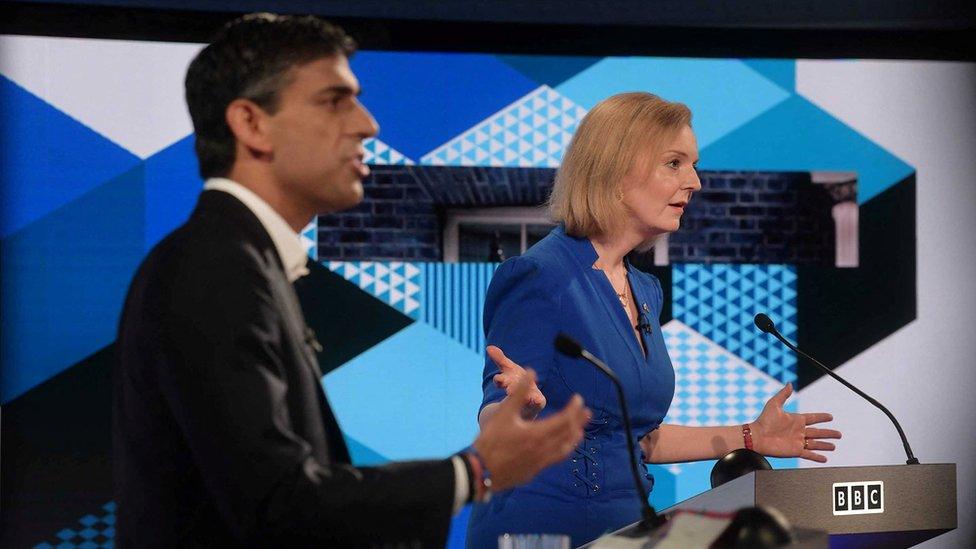
Rishi Sunak and Liz Truss frequently clashed during the Conservative leadership contest
Those races featured plenty of personal barbs too.
Rishi Sunak wrote off Liz Truss's plans as "fairytale economics" which were - gasp - "not Conservative". She in return accused him of "Project Fear" level scaremongering.
But a certain level of ferocity is priced in to Tory contests, where it is broadly taken for granted that ambitious sharks often circle the sitting leader.
That has not been the case in the SNP, where there was never an insider challenge to Ms Sturgeon's authority. Her cabinet smiled and nodded as she pursued her agenda - only to now come out and trash it.
It's not that robust debate is unique to the SNP, it's more that we haven't seen any of it for 15 years.
That it has flared up now is made all the stranger by the fact that unlike that Tory race, the SNP contest is run via a single transferrable vote system.
Members will rank the candidates in order of preference, and second-preference votes might turn out to be crucial if there is no decisive victory in the first round of counting.
That should have encouraged them to reach out to as many party members as possible, including those in rival camps.
But rather than playing for preference order they seem to be aiming for a straight knockout.
That may change again, given each campaign will be hearing feedback from members before the next in the series of TV events.
But things have been said which cannot be unsaid. Grudges will inevitably be borne.
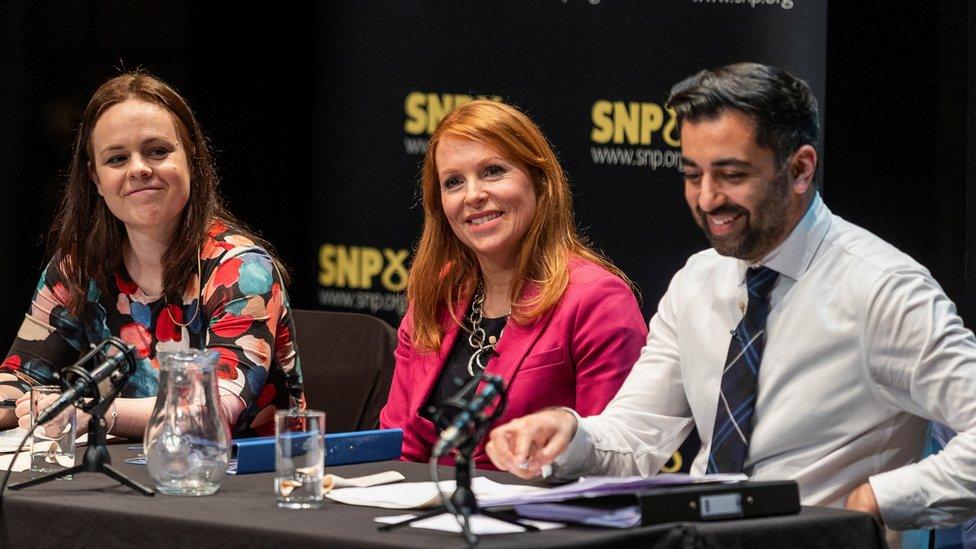
They were all smiles at the in-house hustings events - perhaps less so after the TV debate
So a bigger question might be - how is the winner going to put the pieces back together again?
The SNP's strength has long been unity. Since it took charge at Holyrood in 2007, the party has managed to maintain focus despite hosting a broad range of views within its "big tent".
Perhaps the heat of this debate will temper the steel within the party, and it will emerge stronger than ever.
But given the growing ferocity of the contest, there may be questions over whether it will actually tarnish whoever emerges victorious.
To start with, would any of them actually serve side-by-side in government now?
Mr Yousaf would surely be hesitant to take a job under Ms Forbes, given how she has trashed his record - and indeed to give her a job, should the positions be flipped.
It means there is a bit of an "all or nothing" feel to the Forbes campaign.
She is still clearly a popular figure in the party though, and it means her barbs may land; Mr Yousaf may well come to be seen as an establishment candidate, given all the cabinet endorsements he is racking up.
How well will that sit with a party centred around the distinctly anti-establishment goal of breaking up the union?
On that note, two of the candidates - Ms Regan and Mr Yousaf - are also Republicans who suggested they would re-examine the role of the monarchy in an independent Scotland.
The SNP had an almighty row about that in the 1990s - could a new first minister, who will likely have to attend a Coronation within weeks of victory, charge headlong into yet another constitutional debate?
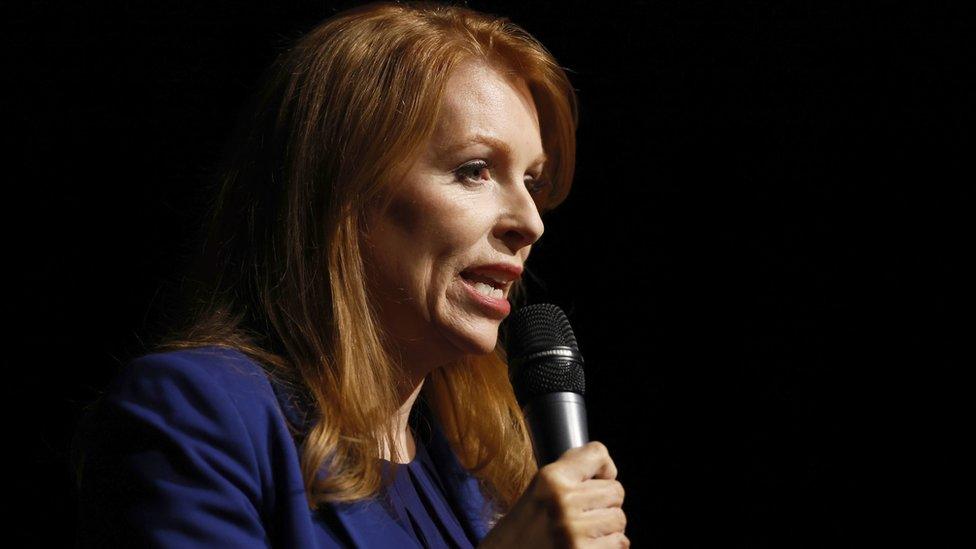
Ash Regan is the candidate trying to pitch most directly to the impatience of SNP members for independence
For all the rhetoric on independence itself, Mr Yousaf and Ms Forbes are both talking like Nicola Sturgeon did two or three years ago - about not having a "magic wand" on the process, of needing to patiently build up support.
Ash Regan is the only one who seems to acknowledge the pressure that was brought to bear on Ms Sturgeon to keep the Yes movement marching along.
Twice a year, Ms Sturgeon had to reach for red meat to persuade party conferences that the goal was still in sight.
In the end, the army is still halfway up the hill and she is leaving office with the issue as stuck as it ever was.
Ms Regan's answer is to go back to the grassroots. Her big reveal of the debate was that she had spoken to the leaders of other pro-independence groups, and that they were "excited" to sign up to a convention with her at the helm.
She retweeted support, external from Alex Salmond - while conceding that the voicemail she had left for the Scottish Greens had gone unanswered.
But will that add up to a proposition that current SNP members are actually keen on? Many may have fond memories of Mr Salmond's leadership, but his most fervent backers likely left with him to set up the Alba Party.
Given his spectacular fallout with Ms Sturgeon, this may not be the kind of unity SNP members are hoping for.
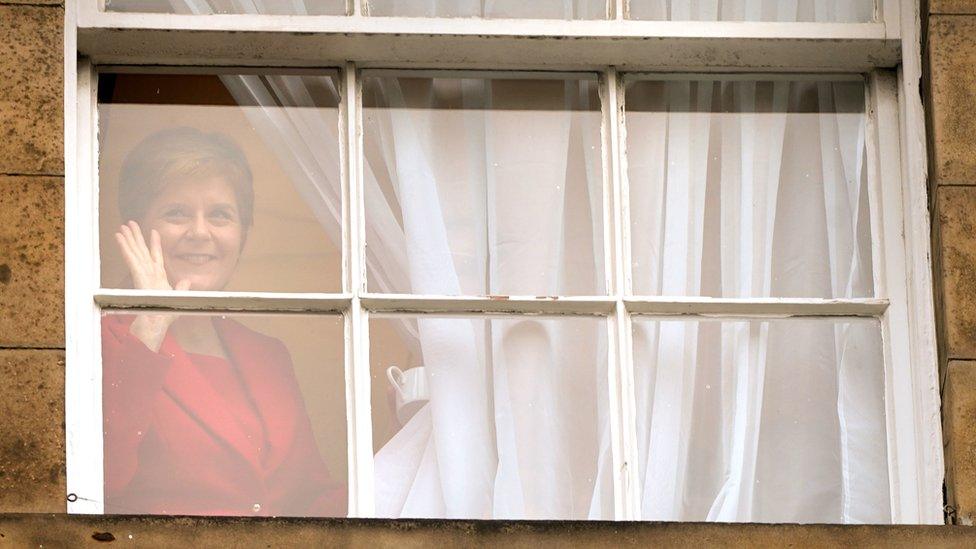
Talking of Nicola Sturgeon, one wonders what she is making of all this.
The outgoing first minister has tried to float above the contest, while seeking a quieter life - exchanging jokes with Andy Murray and Gary Tank Commander on Twitter, and Instagramming her hillwalks up Arthur's Seat.
She does not want to openly endorse a successor, or to cast a long shadow over the contest.
But it's hard to escape the conclusion that the lack of planning for life after Ms Sturgeon which took place during her long reign is coming back to bite the SNP.
This current squabbling is part of her legacy too. And if it does longer-lasting damage to the party's prospects for winning elections and indeed independence, it will not reflect well on anyone involved.